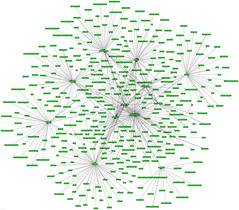“You never change things by fighting the existing reality.
To change something, build a new model that makes the existing model obsolete.”
-
Richard Buckminster Fuller

I've been told that the way we use new technologies is often based on the way we have used (what seem to be similar) technologies in the past. In other words, we try to use new technologies to do earlier tasks, rather than take advantage of new properties or new capabilities; we fail to approach them with a new mindset. Consider that some of us tried to use the computer as a typewriter and many consider the primary function of a smart-phone to be a telephone.
In observing my own encounters with new technologies and the encounters of many faculty members with whom I consult, I sense the notions above are true. When we see a new device that is small, portable, and has a keyboard or in anyway acts like a laptop, it's easy to perceive that device as a laptop. Months ago I came to this conclusion as I contemplated the iPad as a unique device. I created a list of properties of the iPad to inform my thinking about what I might do to use these properties in higher education. It is the properties of the iPad that enable developers to create apps for the iPad. The apps provide a way for the iPad to become a chameleon. In other words, the iPad can be thousands or hundreds of thousands of devices. But in spite of this experience and awareness, I have once again fallen into the trap of perceiving a new device as a laptop. The device under consideration is the Google ChromeBook.
My initial introduction to the Google ChromeBook was in the context of a cart full of ChromeBooks and Apple MacBook Airs for use in teaching and learning. I brought baggage to the conversation with my perception that this cart was a means of providing laptops for faculty who may attend our workshops and did not have a laptop with them.
I must state that in my case, the chrome book required a Google account and then a login to the university SafeNet environment. Having both a personal Google account and a university account also added to some confusion.
I have only used the Google Chrome book on two occasions. The first was my initial encounter and the second was follow-up experimentation. After reflecting on my experience, I think the way one should be introduced to the Google Chrome book is to clearly refer to it as a computing DEVICE. Secondly, I now understand that it is A GOOGLE DEVICE that is focused on Google functionality and uses Google tools; an example is the Chrome browser as the only web browser. So, I would introduce this device by clearly separating the words GOOGLE -- CHROME -- BOOK. Google emphasizes the company and products, Chrome defines the browser that one uses to access Internet resources, and book refers metaphorically to the look, nature and portability of the device.
The chrome book I used was a
Samsung Chromebook. I've since learned that there are different models, made by different manufacturers
(see information on the Google site). Most of these, as I stated earlier, tend to present themselves as a laptop. However, they use apps instead of software that resides on the machine. This is somewhat like the Apple iPad. These devices largely depend upon the Internet cloud for storage. Some apps do provide local functionality and update as the device is synchronized upon the next connection to the cloud. A USB port does provide access to information on a thumb drive or other USB device. There is a version called the
ChromeBook Pixel that has a touch sensitive screen and the interface can work much like the
iPad.
The ChromeBook's basic functionality is an interface to Google and Google plus. So, all of the associated features of those accounts are available and become your basic working tools. Text documents created in Google Docs and/or stored in the Google drive may be output as MS Word files, PDF or other types as desired.
So, at this point my understanding of the Google Chrome book leads to a necessity for me and (I believe others) to understand the complete functionality of the Google environment. This is a great tool for accessing Google resources and for interacting and collaborating with others. IT IS NOT A LAPTOP; It is a new and unique COMPUTING DEVICE.
Afterthought: almost everything is connected in Google. This reminds me of the quote, “There will come a time when it isn't 'They're spying on me through my phone' anymore. Eventually, it will be 'My phone is spying on me'.”
-
Philip K. Dick
Make every effort to come to new technology with an open mind. Play, explore, ask questions and embrace your frustrations. They just may lead to new insight.









